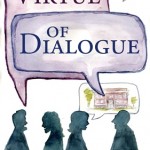 My ebook The Virtue of Dialogue: Conversation as a Hopeful Practice of Church Communities was released last week by Patheos Press, and in it, I argue that open conversation is essential for the health and flourishing of church communities and the places they inhabit.
My ebook The Virtue of Dialogue: Conversation as a Hopeful Practice of Church Communities was released last week by Patheos Press, and in it, I argue that open conversation is essential for the health and flourishing of church communities and the places they inhabit.
Over the next two weeks, I will be running a 10-part series that I am calling “Becoming Conversational” in which I offer suggestions for how churches might enrich the conversational life of their church communities. (Some of these ideas have been adapted from my earlier ebook, Growing Deeper in Our Church Communities, which is available for free download here.
#4) Engaging our Neighbors More Intentionally.
There’s all kinds of things we can do to engage our neighbors more intentionally, but we must bear in mind that our engagement will be most helpful if it is with our neighbors and not for our neighbors. Working with neighborhood associations, block clubs, etc, is a good place to start. Allow neighborhood groups to meet in your church building. Assign someone — ideally someone who lives in the neighborhood — to be the church’s representative to the neighborhood group, and encourage that person to share with the church what is going on with the neighborhood group that the church could be involved in. Don’t try to wrangle or control the neighborhood group, just listen and participate like any other neighbor.
Host a neighborhood party at your church. Engage neighbors who aren’t church members involved in the planning and work of the party. Again, the party should be thrown with the neighbors and not for them (as some sort of means to evangelize them, or some other religious end). Be sure to have food (it could be a potluck) and fun activities for the kids.
Walk, bike or drive around your neighborhood and do asset-mapping, noting key places in the local economy: local businesses, restaurants, parks, community gardens. Observe where people gather at various times throughout the day. Make a map that highlights these assets and distribute it freely in your neighborhood. There are some excellent online resources (such as this one) that can help you explore the possibilities of asset-mapping. Make sure the people in the congregation know about the assets of the neighborhood. Find ways to shop with locally-owned merchants, even if the cost is greater. Become regular customers with the merchants you use; this is an excellent way to develop relationships with them. Find creative ways to promote these merchants. For instance, if you have a brochure to be printed, you could include a small line of print in a margin that says printed by [Printer Name] with a phone number or web address.
Connect with other local churches. Often pastors will have pastoral groups in which they can connect with other local pastors, but there can be great benefits to bringing whole congregations together to worship and serve in relevant ways. Find creative and unifying ways of continuing conversations with these churches over time.
Host a farmers’ market, where nearby farmers can sell their produce or local craftsmen/women can display their homemade wares. One local church in another urban
neighborhood of Indianapolis hosts a weekly farmers’ market through the summer months in which I have participated as a vendor. They have even made arrangements so that poorer neighbors can pick up and use government food vouchers there. Alternatively, you could host a neighborhood produce exchange in the summer where gardeners could swap their surplus produce with one another.
Tomorrow: #5 Engage the Whole Church in Caring for the Church Property
Yesterday: #3 Engaging our Children and Youth in Conversation.











